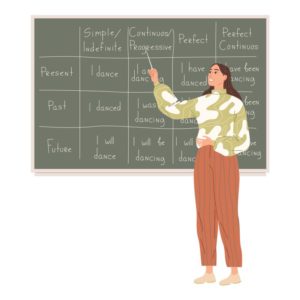When we speak English, there is a grammatical structure consisting of an auxiliary verb that supports the main verb. Auxiliary verbs are used to form negative and interrogative sentences, as well as to form verb tenses.
We can separate modal verbs in English into two different groups:
- Modal verbs (have a very specific set of rules and are practically constant)
- Verbs that can act as auxiliaries.
Next, we will explain the second group: auxiliary function verbs. These are the three most important verbs we need to construct negative, interrogative and compound verbs:
- Tot do
- To have
- To be
Auxiliaries, as we have indicated above, always accompany a main verb:
Does
your brother play the guitar often? – Does your brother play the guitar often?
To do
It is used as an auxiliary in:
- Interrogative phrases
Do
you love me? – Do you love me?
- Negative phrases
I don’t like you – No me gustas
Although the full form is DO NOT and DID NOT, the contraction DON’T and DIDN’T is often used.
- Expressions of emphasis.
I do love you. – I do love you
To have
It is used as an auxiliary in:
- To form the present perfect tense
I have been in many different cities. – I have been in many different cities.
- It can also be used as an auxiliary in the present perfect continuous.
I have been sleeping all day long. – I have been sleeping all day long.
- In the past perfect continuous
We had been playing tennis all night. – He had been playing tennis all night
- And finally in the past perfect
I hadstarted a new degree when I moved here – Emgué una nueva carrera cuando me mude aquí – I starteda new degree when I movedhere
To be
It is used as an auxiliary in:
- Continuous verb forms
Marta is singing – Marta esta cantando – Marta is singing
Marta was signing – Mar ta estaba cantando – Mar ta was singing
- Also in passive verb forms
Rachel is visiting us – Rachel nos visita
We are being visited by Rachel – Hemos sido visitados por Rachel
Will
- Unlike the rest of the verbs, and as with modal verbs, it never adds an s for the third person singular. The contraction of will with the negation is won’t.
- The auxiliary verb will is used to form the future tenses: future simple, future perfect, future continuous, and the first conditional.
He will not play tennis – He will not play tennis.
He will have played tennis .
If he plays tennis, he will be tired – Si juega al tenis, estar cansado.
Exceptions:
We find sentences introduced by the interrogative who or what as the subject of the verb and which make the use of the auxiliary unnecessary.
Who called? – Who called?
What is it? – What is it?
In other words, using WHO implies that it is a person, while using WHAT implies that it is an object or impersonal element such as time or an event.



